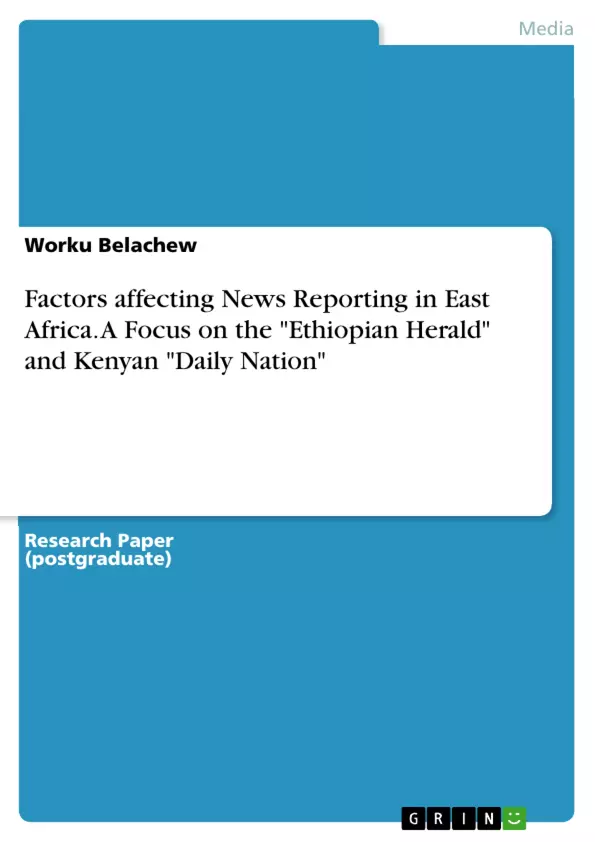This research investigated into the factors that detract news reporting in East Africa, focusing on the Ethiopian Herald and Kenyan Daily Nation. To attain this objective, mixed research approach had been employed. More specifically, in depth interviews, questionnaires and content analysis were integrated. The data then were analyzed concurrently using simple descriptive method and narration.
The results have shown that there are internal and external factors that detract news reporting. News value, perception of journalists, and editorial interests are found major internal factors that create detraction while government influences, NGOs and other private profit making companies are identified as external factors. To mend these detractive factors the newsrooms need to work based on their editorial policies and need to ensure their editorial independence.
African academia of journalism and newsrooms in general need to work in close proximity and better hammer on what African journalism should look like. Equally, press freedom is vital to build a sustainable nation-state. Thus, governments have to leave adequate space to media people so that they can carry out their jobs freely and professionally.
Inhaltsverzeichnis (Table of Contents)
- CHAPTER ONE.
- INTRODUCTION.
- Background of the Study.
- Statement of the problem.
- Objective of the study.
- Research questions.
- Significance of the study.
- Delimitation of the study.
- Limitation of the study.
- CHAPTER TWO.
- REVIEW OF RELATED LITERATAURE.
- News defined.
- News reporting and non-representation.
- Domesticating news reporting.
- News value and representation of Africa.
- Journalism models in Africa.
- Ethicts and news reporting.
- Traditional Vs. New journalism theories.
- Theoritical framework of the study.
- CHAPTER THREE.
- RESEARCH DESIGN AND METHODOLOGY.
- Method of the study.
- Research Setting, Population and Selection Procedures.
- CHAPTER FOUR.
- DATA PRESENTATION, INTERPRETATION AND DISCUSSION.
- News selection.
- Contextualizing news selection criteria.
- Bad news reporting.
- Why negative news production.
- News reporting in Africa and impact of local and global organizations.
- What does it take to report about Africa?
- CHAPTER FIVE
- SUMMARY, CONCLUSIONS AND RESEARCH IMPLICATIONS.
- Summary.
- Conclusions.
- Research implications.
Zielsetzung und Themenschwerpunkte (Objectives and Key Themes)
This thesis aims to examine the factors that affect news reporting in East Africa, particularly focusing on the Ethiopian Herald and Kenyan Daily Nation. The study analyzes how news selection, framing, and representation in these publications reflect the complex realities of the region. Key themes explored include:- The influence of news values and journalistic models on news reporting in East Africa.
- The representation of Africa in international media and its implications for understanding the continent's diverse realities.
- The role of local and global organizations in shaping news coverage of East Africa.
- The ethical considerations and challenges involved in reporting on complex and often sensitive issues in the region.
Zusammenfassung der Kapitel (Chapter Summaries)
Chapter One provides an introduction to the study, outlining its background, objectives, and research questions. It also discusses the significance and delimitation of the research, highlighting the focus on the Ethiopian Herald and Kenyan Daily Nation. Chapter Two reviews existing literature on news reporting, focusing on key concepts such as news values, representation, and journalism models in Africa. It explores how news reporting can both reflect and shape perceptions of the continent, particularly in the context of East Africa. Chapter Three delves into the research methodology, outlining the methods used to collect and analyze data. It provides details on the research setting, population, and data collection procedures, setting the stage for the analysis of news reporting practices. Chapter Four presents the analysis of data collected from the Ethiopian Herald and Kenyan Daily Nation. It examines patterns in news selection, framing, and representation, exploring the factors that influence news reporting practices in these publications. The chapter also investigates the impact of local and global organizations on news coverage of East Africa.Schlüsselwörter (Keywords)
This thesis focuses on news reporting, representation, East Africa, news values, journalism models, ethical considerations, the Ethiopian Herald, and Kenyan Daily Nation. It delves into the complex interplay between global and local influences on news production and consumption in the region. The research explores the impact of these factors on the representation of Africa in international media and its implications for understanding the continent's realities.- Citation du texte
- Worku Belachew (Auteur), 2016, Factors affecting News Reporting in East Africa. A Focus on the "Ethiopian Herald" and Kenyan "Daily Nation", Munich, GRIN Verlag, https://www.grin.com/document/384344



